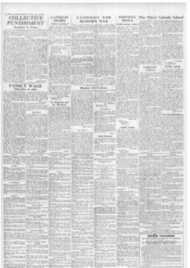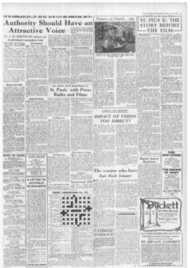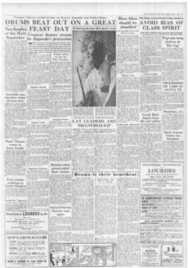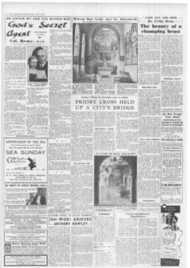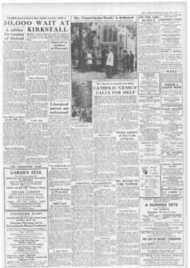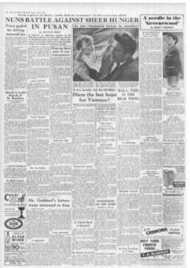Page 4, 2nd July 1954
Page 4
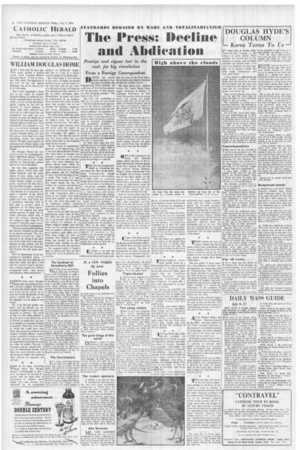
Report an error
Noticed an error on this page?If you've noticed an error in this article please click here to report it.
Tags
Share
Related articles
Catholics And Modern War
The Triumph Of The Will
Letters To The Editor •
American Catholics Want Nothing To Do With A European War
A Chekovian Comedy
WILLIAM DOUGLAS HOME
JUST a little over 10 years ago, this paper printed a leading article called "Captain William Douglas Home." It was in October, 1944, when "the beginning of the end" of the war against Hitlerism was, if we may so put it, in full swing.
That leader supported a letter sent to this paper by Captain Douglas Home, in which he protested vigorously from the field of battle at much of our war propaganda. Judging by his own experience of actual fighting, in which both sides behaved very similarly, he understood how our propaganda had only one aim, namely, to cause the enemy to be viewed in the worst possible light, without regard to the facts. Such propaganda was intended to support unconditional surrender and the destruction of Germany, and Captain Douglas Home saw that this policy would lead us to lose everything except the nominal victory. Though a non-Catholic, he contrasted our military policy with the appeals and advice of the Holy Father.
Mr. Douglas Home has now published his autobiography, called "Half-Term Report" (Longmans, 15s.), and in it his whole attitude to international politics and to the war is described.
He had long suspected that power politics, rather than individual countries and the moral choice of their rulers, were the real cause of the hatreds and wars which people, subject to propaganda, supported. He tells how at the notorious Cliveden—notorious only because of party propaganda —he listened to a discussion between a member of the British Cabinet and a young German called von Trott. Von Trott was a passionate anti-Nazi and he later died "a martyr's death in opposition to the Nazi regime." Now he was arguing that some definite gesture of good will towards Germany would help to show the ordinary German that we wished to right some of the wrongs of Versailles and to undermine some of Hitler's propaganda.
"When he had finished speaking, the Minister stubbed out his cigar in an ashtray and said : 'Yes, it's a fascinating p r o b l e m.' And it seemed to me, sitting at the other end of the table, that, in the hopelessness of that answer and that gesture, he stubbed out Germany, and Europe too, for many years ahead."
With the declaration of the Unconditional Surrender policy, "I felt that the last faint glimmer of hope and sanity had gone. I felt that the Atlantic Charter declaration—already suspect as a political propaganda move — had, openly and cynically, been overthrown."
DESPITE these views, Douglas Home had not declared himself a pacifist—rightly, we believe —because his fundamental objection to the war lay not to war as such but to the immorality of the politics behind that war and to the nihilistic way in which it was waged.
But if he did not totally condemn war, he himself was determined to fight it as cleanly and humanly as possible. The result of this was that when ordered to play his part in the destruction of Le Havre, he asked that the German request to evacuate civilians he granted. There were three days in which this could have been done. The request was refused, and Captain Douglas Home — acting on the standards by which we later judged the captured enemy—told his distressed Colonel that he could not obey his orders. This act of immense 'courage earned him a year in Wormwood Scrubs; but when the same situation arose in the taking of Calais, the Germans were allowed to evacuate the civilians.
ONE of the most interesting things about Mr. Douglas Home's autobiography is that it is by no means an account of a person with an extra dose of seriousness or religion whose moral views and courage were motivated by an exceptional
spiritual or intellectual insight. Still less is it that of a sanctimonious judge of his fellow-men.
His name today is best known as the author of highly successful political farces, and the book for the most part tells the gay story of a Iife such as might be expected of a spirited and witty member of the so called privileged class. Nevertheless, he stood out from .his environment by an independence of spirit and a kind of sixth sense that enabled him to see through the pretence, hypocrisy and moral obtuseness of the leaders and led of his generation.
The indictment which his book implies is by no means confined to the political class. "As we progressed towards war," he writes, "our foreign policy became more and more rigid, the appeal to patriotism increasingly overawed and submerged the appeal to reason, and I felt that the soul of man was being stifled and rendered subservient to the material needs of the moment.
"In the wealth of nationalistic speeches, in the flag-waving, and in the daily denunciations of those who were about to become our enemies, I searched — ever more hopelessly and ever more despairingly for some detached, impartial, neutral voice, which, by its mass appeal to human nature, might have stilled the roar of airplane engines and the rumbling of tanks, and held the dogs of war in leash. That voice, if it had spoken, must have been the voice that spoke beside the Sea of Galilee; the speakers should have been the bishops, priests and deacons of the Church—the theme, the wild, impractical ideal inherent in the Gospel. Thus there would have spoken—in the midst of war—the voice that crieth in the wilderness without whose sound the world becomes a wilderness without a voice."
There was in fact only one such authoritative voice—that of Pius XII. Why did one man, himself not in communion with the Pope and making no pretence to a deeper religious insight, have the vision and the courage which this book so modestly records? It is a grave problem upon which we in these days would do well to meditate. That William Douglas Home has proved to be substantially right, whether we consider the matter from the spiritual or the temporal angle, is hardly open to doubt now that we live among the ruins of political immorality.
The Cardinal at Strawberry Hill HAVING twice visited Strawberry Hill, the ex-Walpole home of the Vincentians, by night, I saw it for the first time by day last Saturday when I went to the opening of the Blessing of the Shrine of Our Lady in the little Gothic "den" in the wood which Walpole built. The grounds with their beautiful lawns arc as imposing in their way as the inside of the house seems when lit up at night. I wonder how many English historical "follies" will be turned to sacred use by the new landed aristocracy which our religous Orders seem to be becoming. But it can only be a coincidence that the Sisters who have turned into a Mary chapel the garden house where Charles II is reputed to have met Nell Gwyn and the Fathers who have done the same with Walpole's Folly are daughters and sons of St. Vincent.
The Cardinal on Saturday was in strong voice and excellent spirits. Standing on the green lawns in his scarlet robes, he made a brilliant picture in the sunshine, and patiently greeted personally many of the visitors. Cheerfully, he allowed himself to he photographed with a very small boy who will not quickly forget such an occasion. When smilingly he put his arm round the boy's shoulders, one remembered the particular love he has for children, a love nurtured during the days when he was Administrator of the Fr. Hudson Homes in Coleshill.
The Connoisseurs TT is always interesting hearing
labout what one might call the connoisseur type of reader of this paper. The last few days have given me knowledge of two whose juxtaposition here is not to be taken as evidence of any sort of similarity between them. William Douglas Home told me of one when I met him recently. It was his neighbour in Wormwood Scrubs (see "leader" above) who devoted every spare minute of
blog comments powered by Disqus



